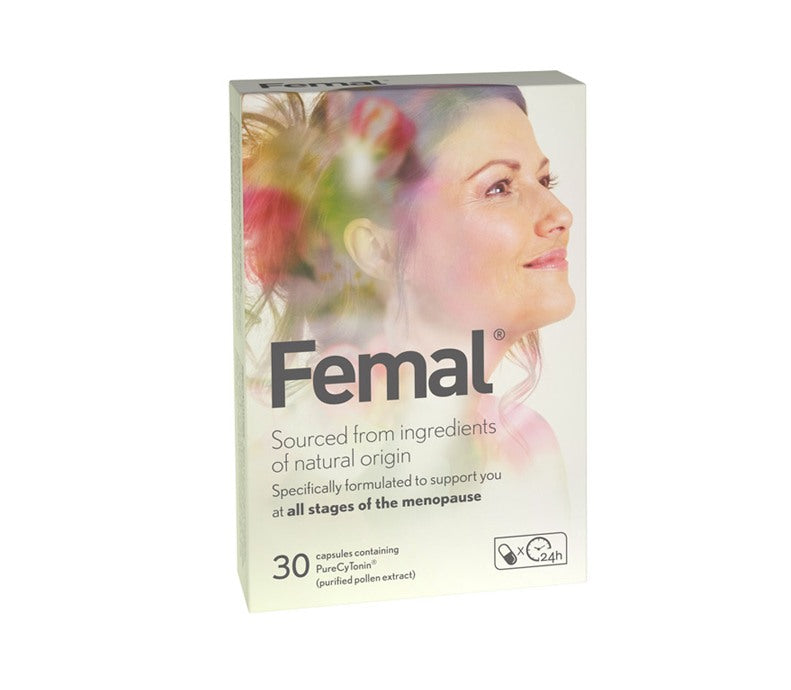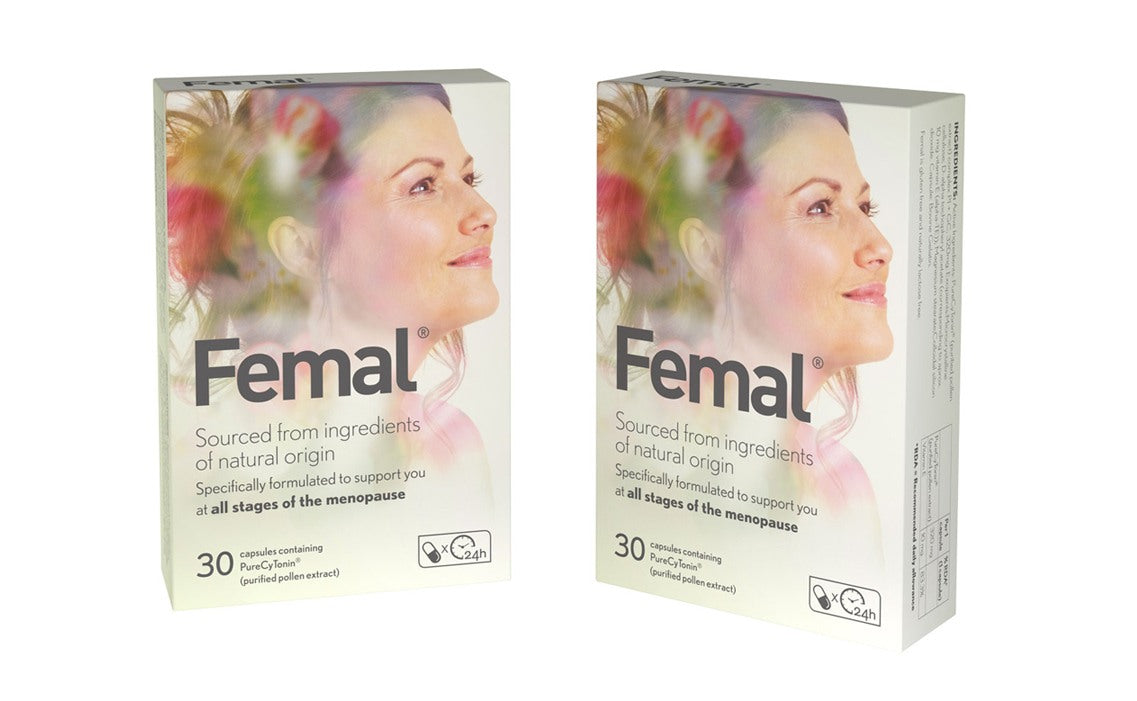Can food improve mood during menopause?

Hot flushes are poster symptoms for the menopause[i] but what’s not so widely recognised are the psychological effects. Anxiety, loss of confidence, panic attacks and seismic mood swings can play havoc with a woman’s sense of balance and wellbeing[ii],[iii].
It’s not all doom and gloom though, diet and nutrition can go a long way to helping you feel better. Here’s how:
Tryptophan
Tryptophan is a precursor to serotonin, the neurotransmitter responsible for making you feel happy[iv]. It’s found in things like turkey, cottage cheese, eggs, beans, legumes, salmon, spinach, bananas, dates, eggs and oats[v],[vi].
Scientists have found meals rich in carbohydrates make it easier for tryptophan to cross the blood-brain barrier, thus increasing serotonin levels in the brain[vii]. It’s important not to underestimate the vital part that carbs play in transferring tryptophan to serotonin, which is partly why low carb diets often make you feel so low and irritable and one reason why you’ll never see me recommending a ketogenic diet[viii].
Over exercising, restricted calorie intake and chronic stress can also deplete tryptophan[ix],[x]. Everything in moderation please!
Magnesium
Vegetables high in fibre and dark green leafy veg rich in magnesium are important for tryptophan, serotonin, gamma amino-butyric acid (GABA) and dopamine production - all vital for good mood[xi],xii.
As well as dark green, leafy vegetables, you can get magnesium from wholegrains, avocados, bananas, dark chocolate, nuts and seeds[xii],[xiii]. Surprising numbers of the population are deficient in this critical mineral[xiv]. If supplementing always check with a qualified health professional first.
Drink wisely
Coffee can increase feelings of anxiety[xv]. If it makes you feel jittery, try replacing with green tea which has smaller amounts of caffeine and contains an amino acid called L-theanine known for its calming effect on the brain[xvi]. Alcohol increases your risk of heart disease, liver disease, high blood pressure, diabetes and certain cancers (including breast)[xvii],[xviii]. It’s also a depressant, so if you’re already feeling on the edge a few cheeky vinos aren’t going to do you any favours[xix].
Thankfully, there’s lots of choice these days when it comes to booze free drinks, from zero percent beer to non-alcoholic cocktails and spirits that taste surprisingly like the real thing. Removing alcohol, even if it’s just a habit of one or two drinks a few times a week, has immediate effects on blood sugar levels, water retention, blood pressure, weight loss, energy levels, emotional stability, sleep changes and pulse rate[xx]–,[xxi],[xxii],[xxiii].
Movement
Daily exercise is as important for mental health and self-esteem as it is for bone density and muscle mass. And it doesn’t have to be high octane either, a simple walk outside can be incredibly useful for shifting bouts of low mood and anxiety. The good news is exercise can also help with vasomotor symptoms like night sweats and hot flushes[xxiv].
Research[xxv] suggests active women have fewer and less severe perimenopausal symptoms. My advice is to build movement into your normal day wherever you can: walk up escalators, run up stairs two at a time, stand on public transport - it all adds up.
Microbiome
There’s no escaping the link between our gut and our brain, especially when you consider that up to ninety percent of the body’s serotonin is made in the digestive tract[xxvi].
The principal players in this production process? Microbes. To keep your gut bugs plentiful and happy you need to feed them a variety of plant sources (30 plus a week if you can), avoid over use of antibiotics, reduce alcohol, minimise stress and include fermented foods such as sauerkraut, kefir and miso into your diet[xxvii]. Many people who suffer with digestive health issues such as IBS swear by probiotics so it might be worth considering adding these into your diet.
Omega 3
According to many studies, including the SMILEs[xxviii] trial carried out in Australia a couple of years ago, there’s a link between omega 3 essential fatty acids and improvement in mood disorders. It’s worth noting that healthy fats are also crucial to hormone production[xxix].
Omega 3 fats have been shown to increase short chain fatty acid (SCGA) producing bacteria that in turn help reduce the risk of inflammatory diseases, type 2 diabetes, obesity and heart disease, which are high risk for menopausal women[xxx],[xxxi]. Help boost your levels by including oily fish such as salmon, herring, mackerel and sardines into your diet twice a week, or look to plant sources like walnuts, chia and flaxseeds[xxxii].
Sleep
Sleep really is our superpower. It’s essential not just for good mental health, but also for emotional, physical and hormonal wellbeing[xxxiii]. Tiredness increases ghrelin (your hunger hormone) which means you often eat more when you’re sleep deprived and, to boot, poor sleep can also affect blood sugar regulation[xxxiv],[xxxv].
It’s perhaps one of the most powerful performance enhancers known to us, yet so many of us aren’t getting enough. Practise good sleep hygiene (no screens before bed!), try Epsom salt baths, eat magnesium rich foods such as green leafy veg, almonds and bananas or invest in sleep aids like pillow sprays.
Every single woman will go through the menopause, but exactly what her experience will be is unknown. What we do know is that even though the majority of us will suffer symptoms that impact our lives, we’re still not very good at talking about ‘the big M’. This needs to change. By opening up and sharing, we become more empowered and far better equipped to make this transition something to be celebrated. Join in the conversation on social media by using #ExpressYourFemal and read about other women’s experiences here. [ https://www.femal.co.uk/pages/expressyour]
[i] National Health Service. Hot flushes: Menopause [online] August 2018. Available from: https://www.nhs.uk/conditions/menopause/hot-flushes/ [Last accessed: January 2020].
[ii] National Health Service. Symptoms: Menopause [online] August 2018. Available from: https://www.nhs.uk/conditions/menopause/symptoms/ [Last accessed: January 2020].
[iii] Prima. The 34 symptoms of perimenopause you need to know [online] April 2016. Available from: https://www.prima.co.uk/diet-and-health/news/a35329/perimenopause-pre-menopause-recognise-symptoms/ [Last accessed: January 2020].
[iv] British Dietetic Association. Food and mood: Food Fact Sheet [online] 2017. Available from: https://www.bda.uk.com/resource/food-facts-food-and-mood.html [Last accessed: January 2020].
[v] British Dietetic Association. Depression and Diet: Food Fact Sheet [online] April 2016. Available from: https://mafiadoc.com/depression-and-diet-food-fact-sheet_599cfdef1723dd0f406ee1c9.html [Last accessed: January 2020].
[vi] Getselfhelp. Food & Mental Health: Nutrients Table [online]. Available from: https://www.getselfhelp.co.uk/docs/feedingminds_nutrients.pdf [Last accessed: January 2020].
[vii] Wurtman RJ, et al. Am J Clin Nutr 2003;77:128–132.
[viii] Physicians Committee for Responsible Medicine. Food and Mood: Eating Plants to Fight the Blues [online]. Available from: https://www.pcrm.org/good-nutrition/food-and-mood [Last accessed: January 2020].
[ix] Strasser B and Fuchs D. Int J Tryptophan Res 2016;9:9–16.
[x] Höglund E, et al. Front Endocrinol (Lausanne) 2019;10:158.
[xi] Briguglio M, et al. Nutrients 2018;10:591.
[xii] National Health Service. Others: Vitamins and minerals [online] March 2017. Available from: https://www.nhs.uk/conditions/vitamins-and-minerals/others/ [Last accessed: January 2020].
[xiii] Healthline. 10 Magnesium-Rich Foods That Are Super Healthy [online]. Available from: https://www.healthline.com/nutrition/10-foods-high-in-magnesium#section11 [Last accessed: January 2020].
[xiv] Schwalfenberg GK and Genuis SJ. Scientifica (Cairo) 2017;2017:4179326.
[xv] Health. Why Drinking Coffee Might Be Fueling Your Anxiety [online] December 2018. Available from: https://www.health.com/condition/anxiety/how-coffee-increases-anxiety [Last accessed: January 2020].
[xvi] Mason R. Alternative and Complementary Therapies 2004;7:91–95.
[xvii] National Health Service. The risks of drinking too much [online] May 2019. Available from: https://www.nhs.uk/live-well/alcohol-support/the-risks-of-drinking-too-much/ [Last accessed: January 2020].
[xviii] Medical News Today. Does alcohol affect blood sugar levels in diabetes? [online]. Available from: https://www.medicalnewstoday.com/articles/312918.php [Last accessed: January 2020].
[xix] Healthline. Alcohol and Anxiety [online]. Available from: https://www.healthline.com/health/alcohol-and-anxiety [Last accessed: January 2020].
[xx] Drink Aware. Benefits of drinking less [online]. Available from: https://www.drinkaware.ie/facts/benefits-of-cutting-down [Last accessed: January 2020].
[xxi] Drinkaware. Alcohol and Sugar [online]. Available from: https://www.drinkaware.co.uk/alcohol-facts/health-effects-of-alcohol/effects-on-the-body/alcohol-and-sugar/ [Last accessed: January 2020].
[xxii] Cardiomyopathy. About heart failure [online] March 2017. Available from: https://www.cardiomyopathy.org/about-cardiomyopathy/heart-failure [Last accessed: January 2020].
[xxiii] Healthfully. Problems With Water Retention and Drinking Alcohol [online] December, 2018. Available from: https://healthfully.com/problems-with-water-retention-and-drinking-alcohol-4886288.html [Last accessed: January 2020].
[xxiv] Bailey TG, et al. J Physiol 2016;594:657–667.
[xxv] Blümel JE, et al. Menopause 2016;23:488–493.
[xxvi] Martin CR, et al. Cell Mol Gastroenterol Hepatol 2018;6:133–148.
[xxvii] Life Extension. Maintaining a Healthy Microbiome [online]. Available from: https://www.lifeextension.com/protocols/gastrointestinal/maintaining-a-healthy-microbiome [Last accessed: January 2020].
[xxviii] Jacka FN, et al. BMC Med 2017;15:23.
[xxix] Smarter Nutrition. The Link Between Healthy Fats and Balanced Hormones [online] April 2019. Available from: https://smarternutrition.com/blogs/news/the-link-between-healthy-fats-and-balanced-hormones [Last accessed: January 2020].
[xxx] The Gut Health Doctor. Omega what? [online]. Available from: https://www.theguthealthdoctor.com/all-articles/omega-3 [Last accessed: January 2020].
[xxxi] Healthline. How Short-Chain Fatty Acids Affect Health and Weight [online] April 2016. Available from: https://www.healthline.com/nutrition/short-chain-fatty-acids-101#section2 [Last accessed: January 2020].
[xxxii] British Dietetic Association. Omega-3: Food Fact Sheet [online]. Available from: https://www.bda.uk.com/resource/omega-3.html [Last accessed: January 2020].
[xxxiii] National Institutes of Health. The Benefits of Slumber: Why You Need a Good Night’s Sleep [online] April 2013. Available from: https://newsinhealth.nih.gov/2013/04/benefits-slumber [Last accessed: January 2020].
[xxxiv] Taheri S, et al. PLoS Med 2004;1:e62.
[xxxv] Diabetes.co.uk. Diabetes and Sleep [online] January 2019. Available from: https://www.diabetes.co.uk/diabetes-and-sleep.html [Last accessed: January 2020].

Femal One Pack
30 capsules - 1 Month Supply
Customer loyalty programme*:
*Discount code not applicable on loyalty programme
Free shipping

Femal Two Pack
60 capsules - 2-Month Supply
Customer loyalty programme*:
*Discount code not applicable on loyalty programme
£56.31
Free shipping
